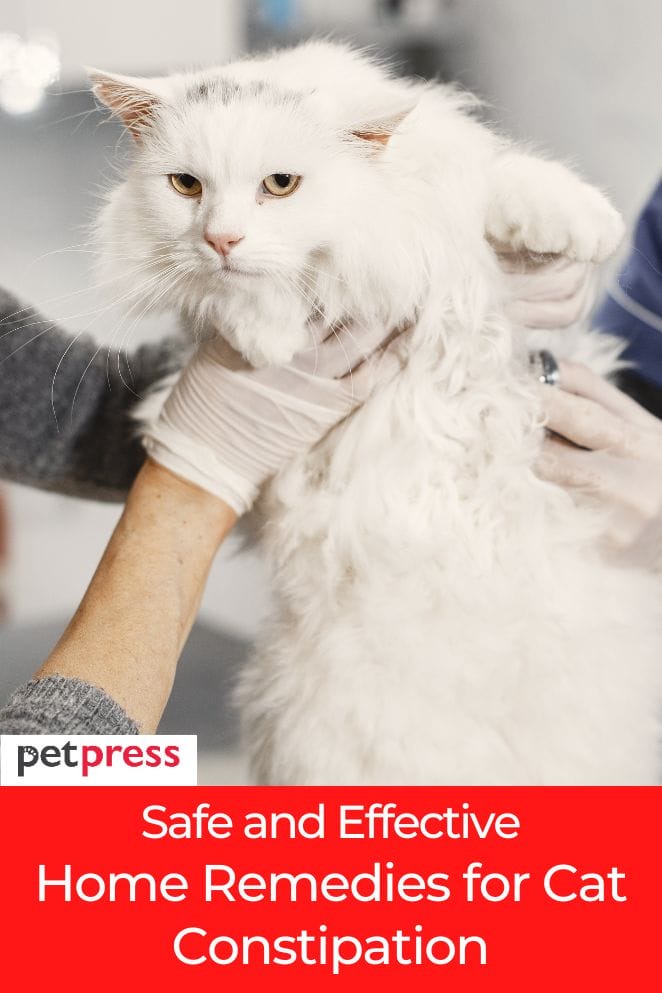
Constipation in cats is more common than you might think.
It can cause significant discomfort and even lead to more serious health issues if left untreated.
Recognizing the symptoms and understanding the causes can help you provide timely and effective care for your feline friend.
In this article, we’ll explore common symptoms and causes of constipation in cats, effective home remedies, prevention tips, and when it’s time to seek veterinary care.
Common Symptoms of Constipation in Cats
Recognizing constipation in cats can be challenging because they can’t communicate their discomfort.
However, there are some key signs to watch for that can indicate constipation:
Infrequent bowel movements
If you notice that your cat isn’t using the litter box as often as usual, or if they only produce a few small, hard stools, constipation could be the issue.
Healthy cats typically have regular bowel movements, so a change in this pattern can be a clue.
Straining in the litter box
When a cat is constipated, they might strain or even cry out while trying to defecate.
You might see them spending more time in the litter box, appearing uncomfortable or distressed.
Dry, hard stools
Constipated cats often produce stools that are dry and hard, resembling small pebbles.
These stools can be difficult for them to pass and can cause discomfort.
Loss of appetite
If your cat is constipated, they may eat less than usual.
Constipation can make them feel unwell, leading to a decreased interest in food.
Abdominal discomfort
You might notice that your cat’s abdomen feels swollen or that they show signs of discomfort when you touch their belly.
Constipation can cause bloating and pain in the abdominal area.
Lethargy
Constipation can make your cat feel unwell, leading to reduced energy levels and a lack of interest in their usual activities.
They may seem more tired and less playful than usual.
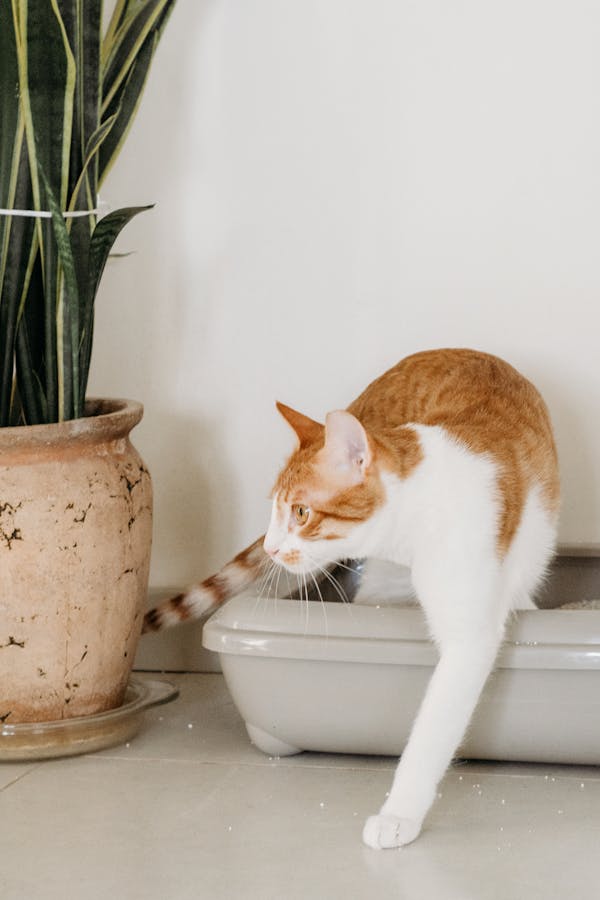
Potential Causes of Constipation
Understanding what might be causing constipation in your cat can help you find the right solution.
Here’s a closer look at common factors that can contribute to constipation:
Dehydration
If your cat isn’t drinking enough water, their stools can become hard and dry, making them difficult to pass.
Ensuring your cat has constant access to fresh water is essential for preventing dehydration and maintaining healthy digestion.
Diet
A diet low in fiber can lead to constipation because fiber helps keep the digestive system moving.
On the other hand, a diet that consists mainly of dry food can also contribute to constipation.
Hairballs
Cats groom themselves regularly, and this can lead to hairballs.
When cats ingest hair, it can accumulate and cause blockages in their digestive tract, leading to constipation.
Regular grooming and hairball remedies can help manage this issue.
Medical conditions
Certain health problems can contribute to constipation.
Conditions like kidney disease, diabetes, and inflammatory bowel disease (IBD) can affect the digestive system and lead to constipation.
If your cat has a chronic condition, managing their overall health with the help of a vet is important.
Obesity
Overweight cats are more likely to experience constipation due to less physical activity.
Extra weight can slow down their digestion and lead to irregular bowel movements.
Ensuring your cat maintains a healthy weight through a balanced diet and regular exercise can help.
Stress
Cats are sensitive to changes in their environment or routine.
Stressful situations, such as moving to a new home or changes in their daily schedule, can impact their digestive health and lead to constipation.
Keeping a stable and calm environment can help reduce stress-related constipation.
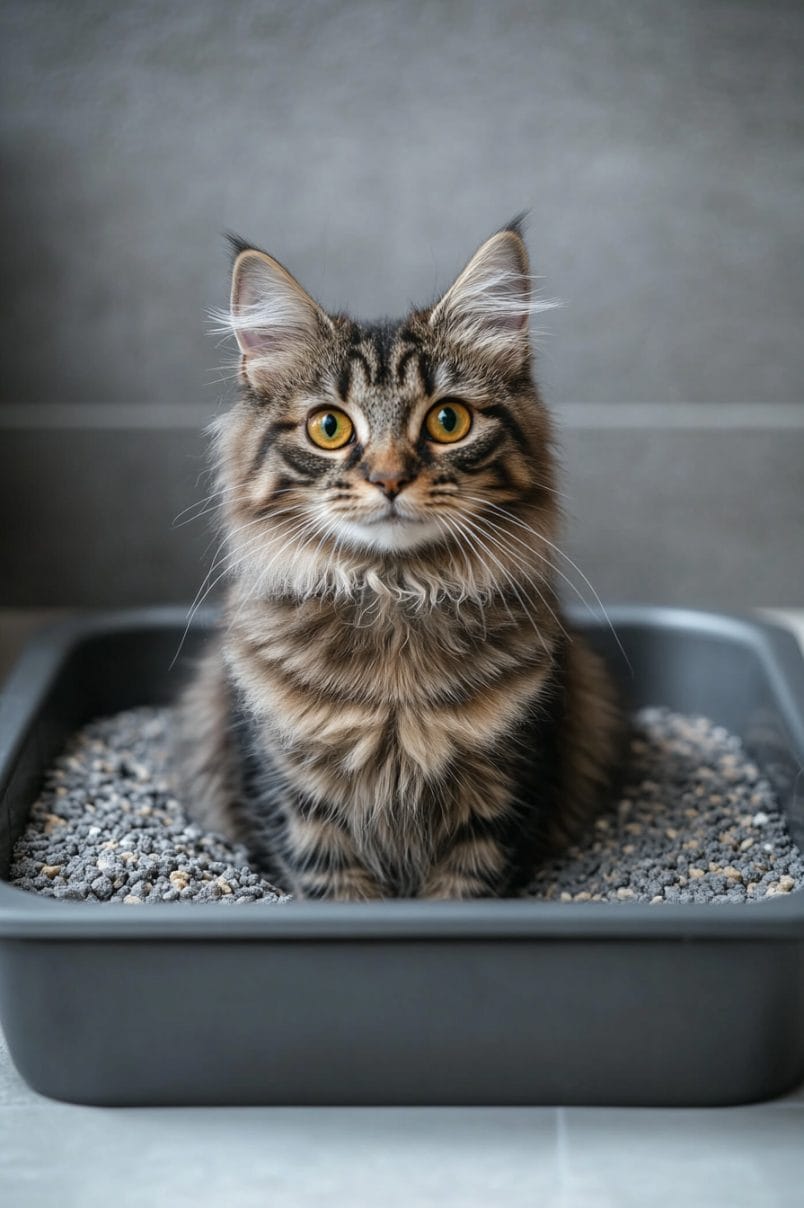
Home Remedies for Cat Constipation
If your cat is mildly constipated, there are several home remedies you can try to alleviate their discomfort.
Hydration
Proper hydration is key to preventing constipation.
- Fresh water: Always provide fresh water for your cat and consider placing multiple water bowls around your home. This makes it easier for your cat to stay hydrated.
- Wet food: Incorporate wet food into your cat’s diet. Canned food contains more moisture than dry kibble, which helps increase their overall water intake.
- Broth: Offer chicken or beef broth (make sure it’s free from onions and garlic) to encourage your cat to drink more fluids. This can be a tasty way to boost their hydration.
Dietary adjustments
Changes to your cat’s diet can alleviate constipation.
- Fiber: Adding a small amount of canned pumpkin (1-2 teaspoons) to your cat’s food can be very beneficial.
- High-fiber cat food: These specially formulated foods contain ingredients designed to promote regular bowel movements.
- Probiotics: Probiotic supplements can help maintain a healthy balance of gut bacteria, which supports digestion and regular bowel movements.
Exercise
Keeping your cat active can stimulate their digestive system and help prevent constipation.
- Playtime: Engage your cat with toys like laser pointers, feather wands, or interactive puzzles to keep them active and encourage movement.
- Climbing structures: Providing climbing trees or shelves can encourage your cat to climb and jump, which also helps keep their digestive system active.
Hairball remedies
Regular grooming and hairball treatments can reduce the risk of hairballs, which can contribute to constipation.
- Regular brushing: Brush your cat frequently to remove loose hair. This helps reduce the amount of hair they ingest and prevents hairballs from forming.
- Hairball treats: Specialized treats and gels designed for hairball control can help your cat pass ingested hair more easily, preventing blockages and related constipation.
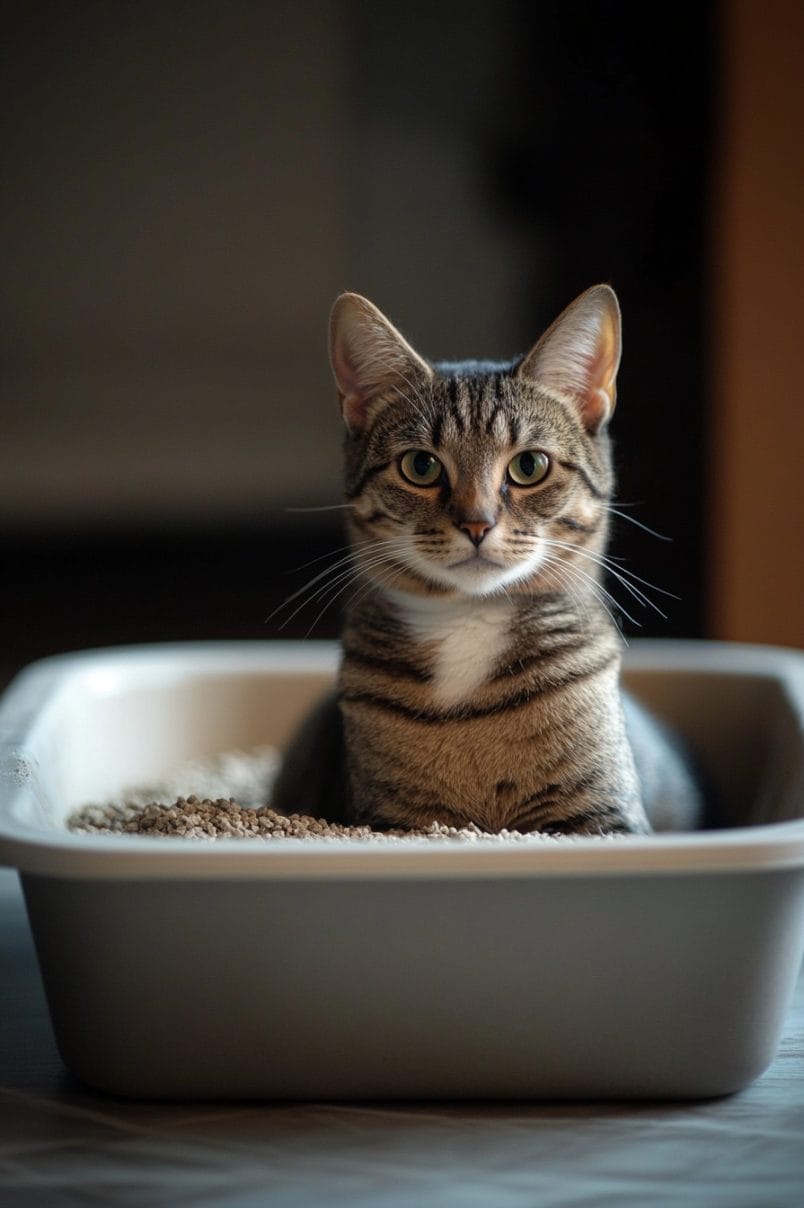
Prevention Tips
Preventing constipation in your cat is often easier than dealing with it once it’s a problem.
Here’s how you can help keep your cat’s digestive system in good shape:
Balanced diet
Feeding your cat a well-rounded diet is crucial.
Include both wet food and high-fiber options in their meals.
Wet food provides extra moisture, which helps keep their stools soft, while high-fiber foods aid in regular bowel movements.
Hydration
Always make sure your cat has access to fresh, clean water.
Proper hydration is key to preventing constipation.
You can also add moisture to their diet by incorporating wet food or offering a bit of broth (free from onions and garlic) to encourage them to drink more fluids.
Regular exercise
Keeping your cat active is important for their overall health and helps stimulate their digestive system.
Engage in daily play sessions with toys like laser pointers or feather wands to keep them moving.
Providing climbing structures, such as cat trees or shelves, encourages them to climb and jump, which also supports healthy digestion.
Grooming
Regular brushing helps manage hairballs, which can contribute to constipation.
By brushing your cat frequently, you remove loose hair and reduce the amount they ingest during grooming.
This can prevent hairballs from forming and causing blockages in their digestive tract.
Routine vet visits
Regular check-ups with the veterinarian are essential for maintaining your cat’s health.
Routine visits allow your vet to monitor your cat’s overall health and catch any potential issues before they become serious.
This includes keeping an eye on any signs of digestive problems and addressing them early.
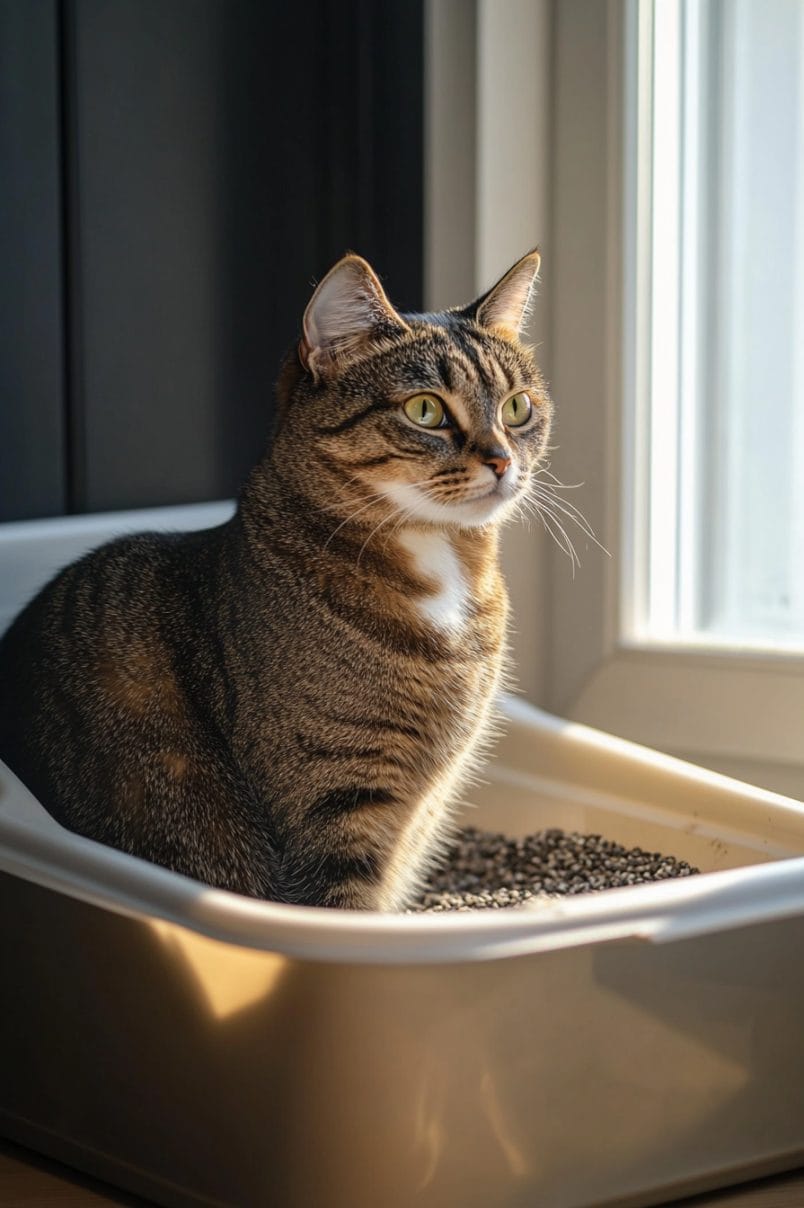
When to Seek Veterinary Care
While home remedies can help manage mild constipation, there are certain situations where you should definitely seek veterinary care for your cat.
Here’s when to contact your vet:
Persistent constipation
If your cat’s constipation lasts more than 48 hours, it’s important to consult your veterinarian.
Extended constipation can indicate a more serious problem that might need professional treatment.
Severe discomfort
If your cat appears to be in significant pain, has a noticeably swollen abdomen, or shows other signs of distress, it’s crucial to seek immediate veterinary care.
Severe discomfort or bloating could suggest a serious condition that requires prompt attention.
Underlying conditions
If your cat has any pre-existing medical conditions, such as kidney disease or diabetes, consult your vet before trying any home remedies.
These conditions can complicate constipation and may require specialized treatment.
Lethargy and vomiting
If your cat is unusually lethargic or starts vomiting, these symptoms could signal a more serious issue beyond constipation.
Both lethargy and vomiting are signs that your cat might be dealing with a significant health problem that needs professional evaluation.
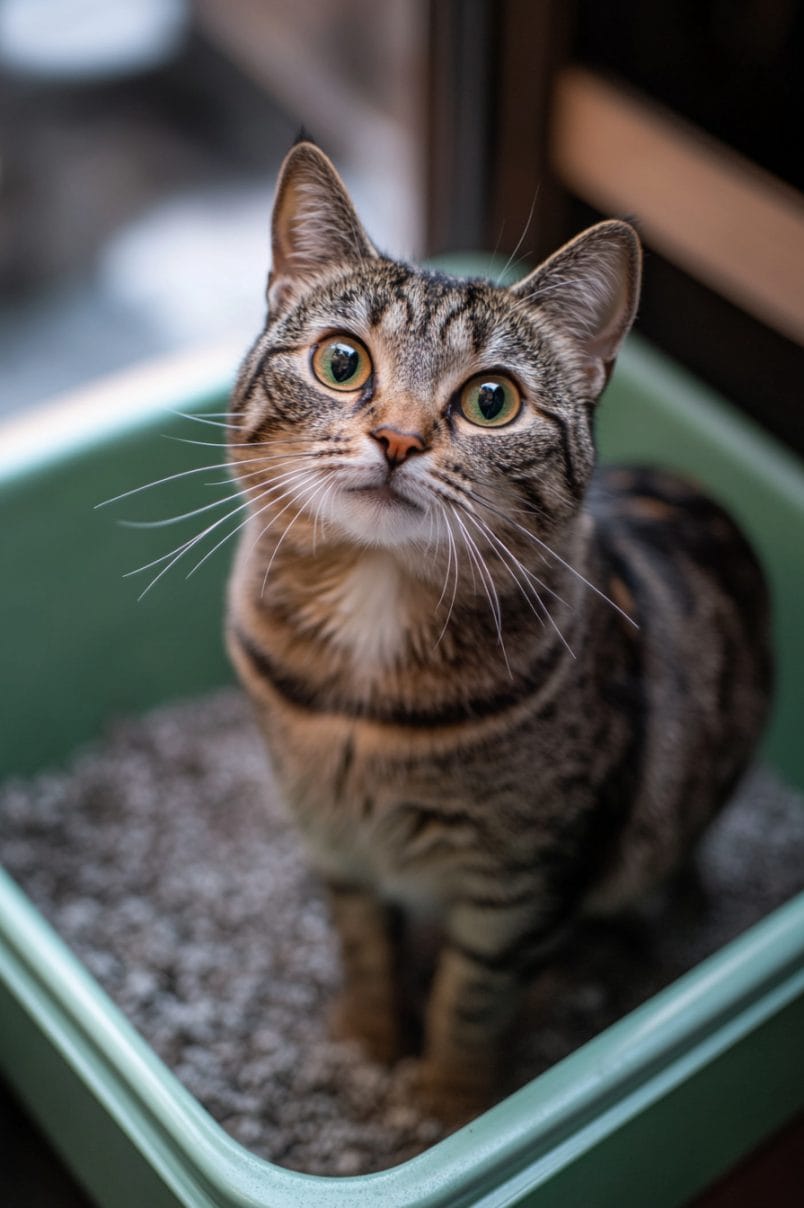
Conclusion
Constipation in cats can be uncomfortable and potentially harmful if not addressed promptly.
By understanding the symptoms, causes, and effective home remedies, you can help your cat find relief and maintain their digestive health.
Always ensure your cat stays hydrated, gets a balanced diet, and remains active.
If home remedies don’t resolve the issue, don’t hesitate to seek veterinary care.
Your vet can provide the best advice and treatment for your cat’s specific needs.
FAQs
No, you should never give your cat over-the-counter laxatives without consulting your vet. Many human medications can be toxic to cats.
Start with 1-2 teaspoons of pure canned pumpkin mixed into your cat’s food. Always consult your vet for the appropriate dosage.
Occasional constipation can happen, but persistent or severe constipation should be addressed by a vet to rule out underlying health issues.
- Does Cat Litter Melt Ice? The Complete Guide to Winter Safety - January 30, 2026
- Happy Tail Dogs: Understanding This Common Canine Condition - January 29, 2026
- How Cold Can Outdoor Cats Handle? Feline Winter Safety - January 27, 2026


GIPHY App Key not set. Please check settings